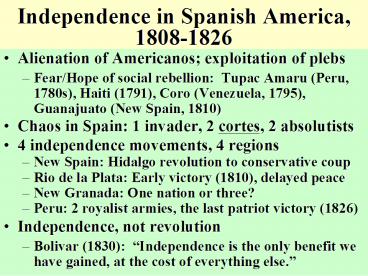Independence in Spanish America, 18081826
Title:
Independence in Spanish America, 18081826
Description:
Chaos in Spain: 1 invader, 2 cortes, 2 absolutists. 4 independence movements, 4 regions ... Haiti (1791) Coro (Venezuela, 1795) Guanajuato (New Spain, 1810) ... –
Number of Views:81
Avg rating:3.0/5.0
Title: Independence in Spanish America, 18081826
1
Independence in Spanish America,1808-1826
- Alienation of Americanos exploitation of plebs
- Fear/Hope of social rebellion Tupac Amaru
(Peru, 1780s), Haiti (1791), Coro (Venezuela,
1795), Guanajuato (New Spain, 1810) - Chaos in Spain 1 invader, 2 cortes, 2
absolutists - 4 independence movements, 4 regions
- New Spain Hidalgo revolution to conservative
coup - Rio de la Plata Early victory (1810), delayed
peace - New Granada One nation or three?
- Peru 2 royalist armies, the last patriot victory
(1826) - Independence, not revolution
- Bolivar (1830) Independence is the only
benefit we have gained, at the cost of everything
else.
2
Alienation of Americanos exploitation of plebs
- Alienation of americanos by imperialism of
Spanish monarchists and liberals. - Exploitation of plebs
- 1760 If in all Spain one should picture the
number of poor and wretched that there are, one
would not find as many nor as denuded as in
Mexico (City) alone.... Unfortunately in this
city one finds two diametrically opposed
extremes great wealth and maximum poverty. - Great Fear/Hope of social rebellion
- Tupac Amaru (Peru, 1780s)
- Haiti (1791)
- Coro (Venezuela, 1795)
- Guanajuato (New Spain, 1810)
3
Chaos in Spain Invasion, 2 parliaments, 2
attempts at absolutism
- Effect of French Revolution on independence
- regicide, not rights of man
- Napoleons invasion shattered the dynastic tie,
not the struggle for liberty or democracy - Spanish cortes, implacable imperialists
- refused colonial representation proportional to
population, and other colonial demands - Agustin Iturbide (1821) The Cortes seem
determined to lose these possessions. - Ferdinand VII (absolute monarch 1813-1820
1823-1833) learned nothing, forgot nothing - harsh reprisals in Spain and Spanish America
- 1820 coup Spain could no longer protect against
revolt in America
4
4 independence movements, 4 regions
- New Spain, 4 phases
- Hidalgo revolution (1810-11)
- Morelos disciplined polit-military campaign
(1811-15) - Guerrilla insurgencies on the periphery
- Conservative coup led by royalist commander,
Augustin de Iturbide (1822) - Rio de la Plata Early victory (1810), delayed
peace (18??) - New Granada One nation or three?
- Peru 2 royalist armies, the last patriot victory
(1826) - Cuba, always faithful isleuntil 1896.
Slavery is worth an army of 100,000.
5
Chronology, geography of the Hidalgo phase
Chihuahua
- Sept. 16, 1810 beginning of insurrection at
Dolores - Sept. 28, 1810 sacking of Guanajuato
- Jan. 17, 1811 defeat at Calderon bridge
(Guadalajara) by Felix Calleja - July 31, 1811 Hidalgo beheaded in Chihuahua
Guanajuato
Dolores
Guadalajara
6
Hidalgo handbill directed at Creoles(late 1810)
- Noble Americanos, only for God does one give
ones life, but for the Gachupines, no, no, no.
As they did not defend the Jesuits - Sought to reassure creoles that lives and
property, even of Gachupines, would be respected.
7
Hidalgos land reform, Dec. 15, 1810
- in exchange for rents due, . . . lands must be
handed over to the Naturales for cultivation
because it is my will that their use be solely
for the Naturales of their respective Villages.
8
The missing phase, 1815-1821regional
insurgencies on the periphery
- 1. Osorno
- 2. Ignacio Rayon
- 3. Vicente Guerrero
- 4. Guadalupe Victoria
- 5. Servando Mier y Teran
1
4
MexicoCity
2
3
5
9
Simon Bolivar on independence
- 1830 Independence is the only benefit we have
gained, at the cost of everything else. - America is in chaos.
10
Independence, not revolution
- John Lynch, Spanish American Revolutions
- Independence was a powerful yet finite force,
which tore through Spanish America like a great
storm, sweeping away the lines of attachment to
Spain and the fabric of colonial government, but
leaving intact the deeply rooted bases of
colonial society. - . . . It was a political revolution in which
one ruling class displaced another.
11
End































